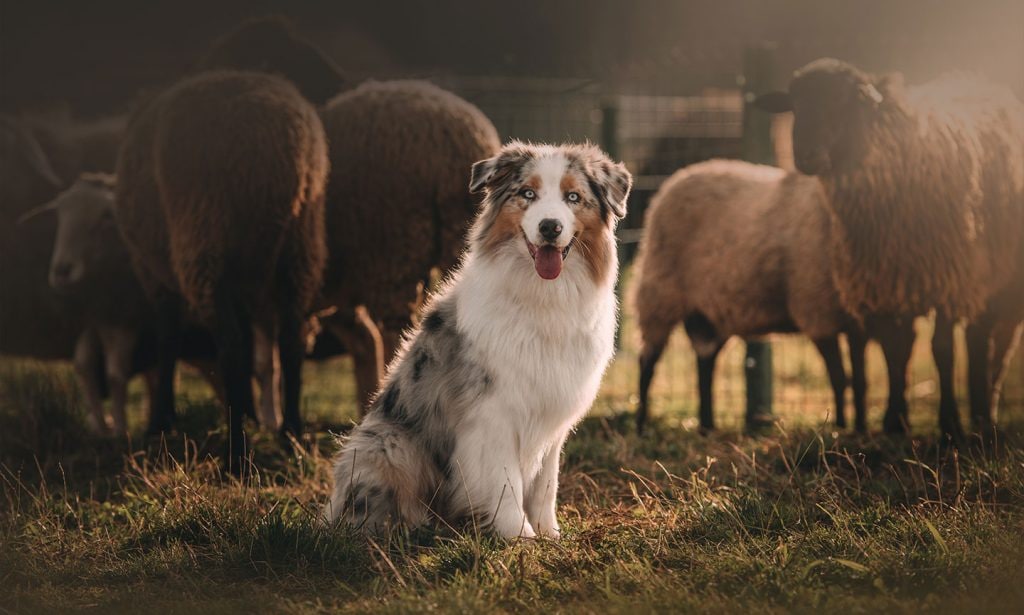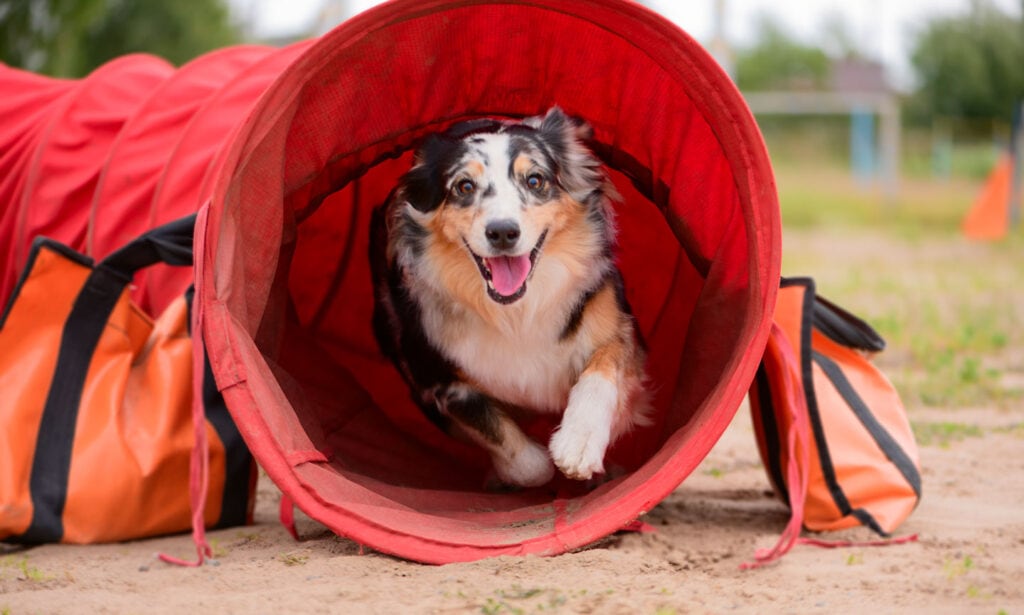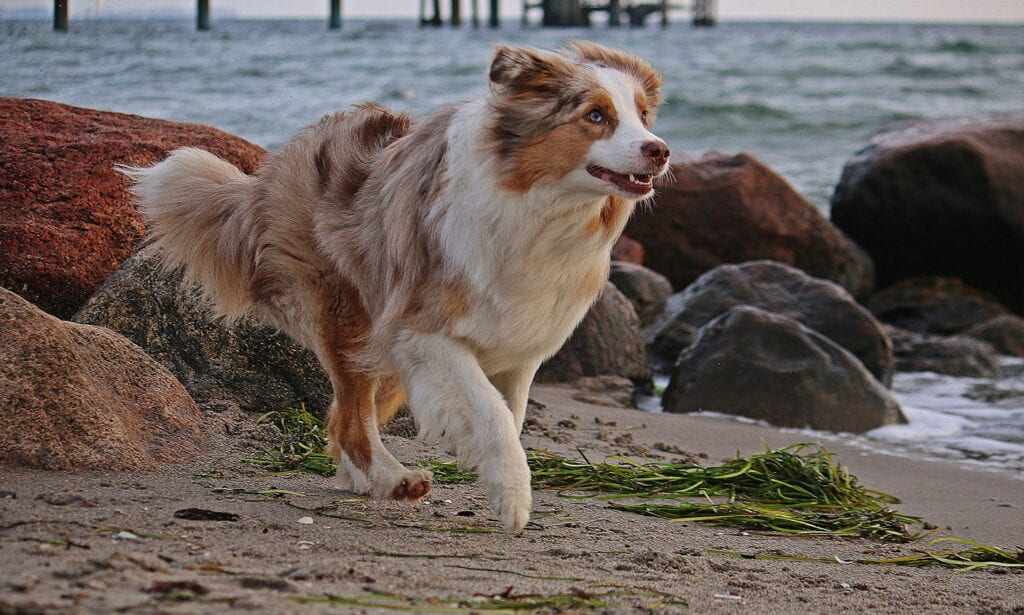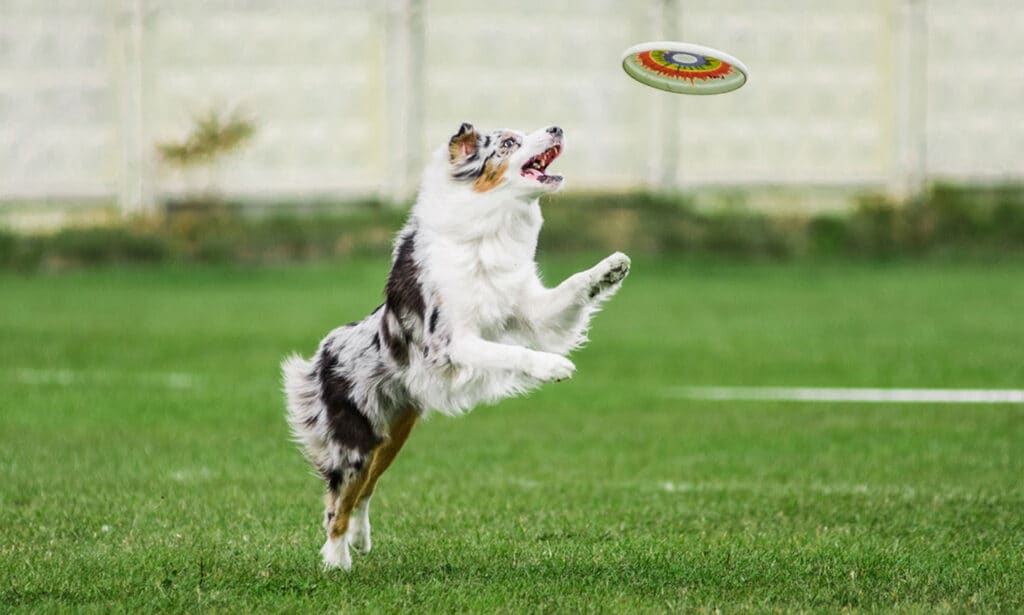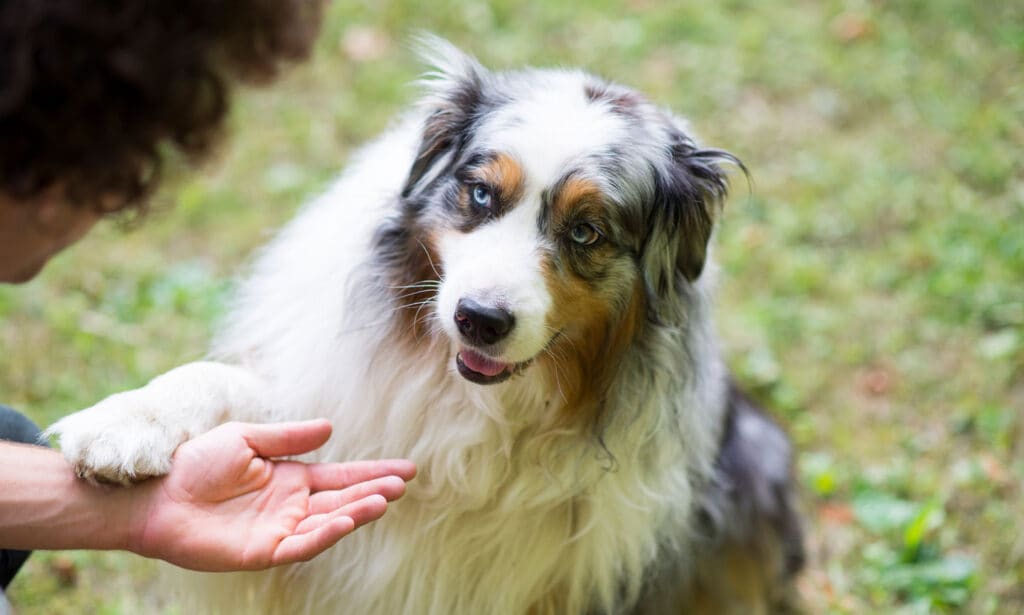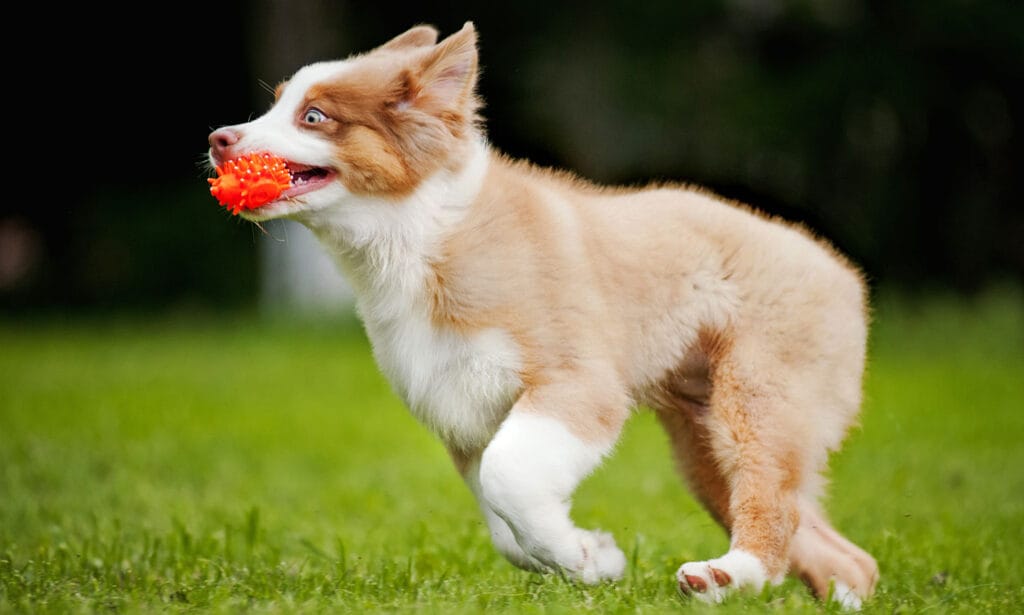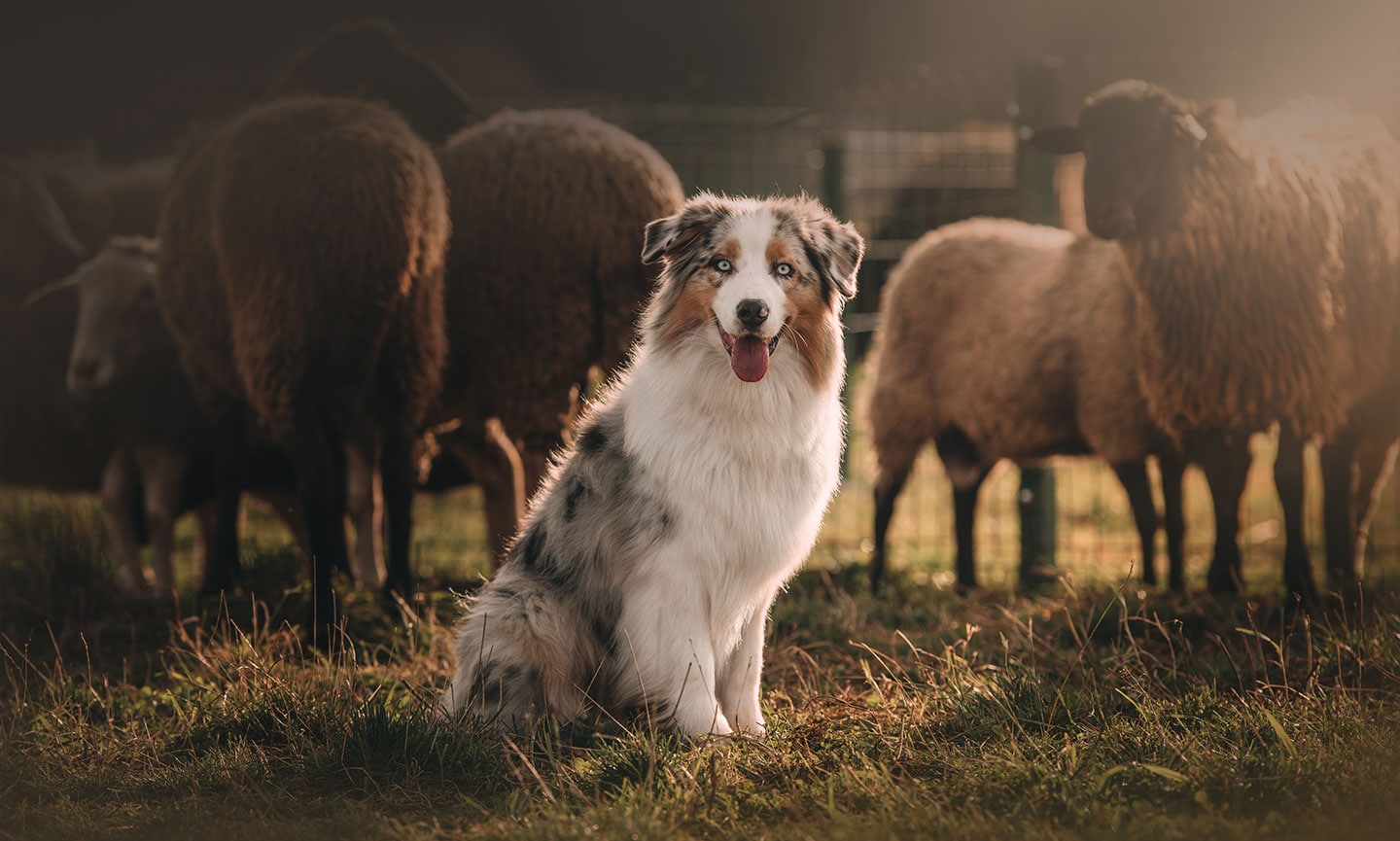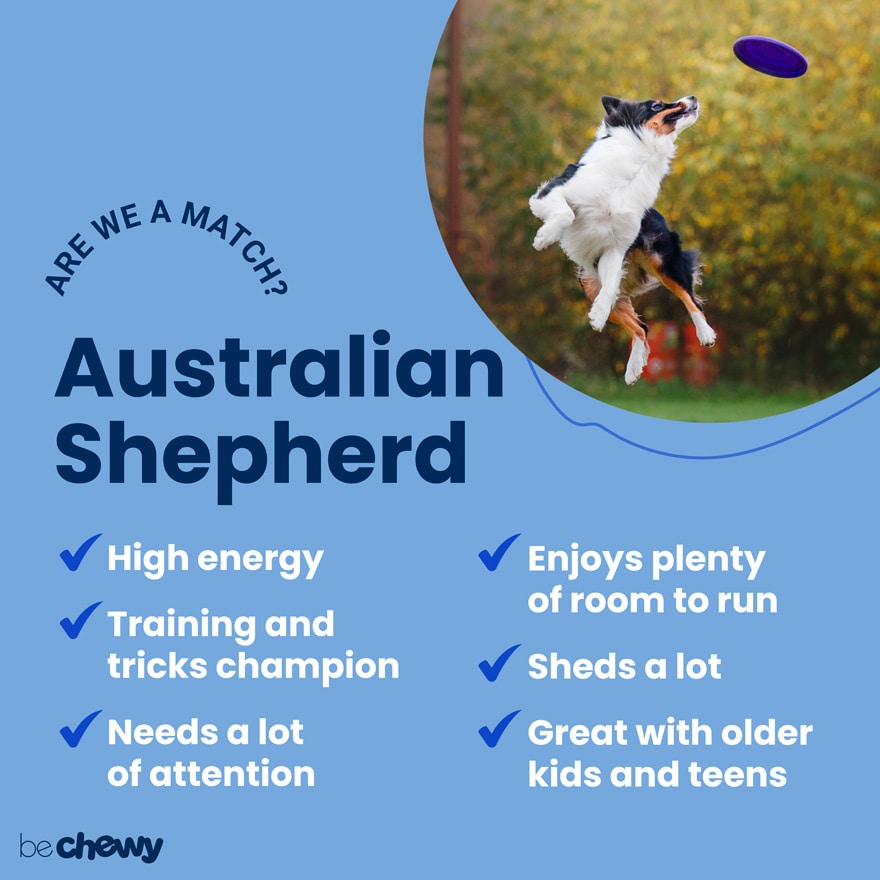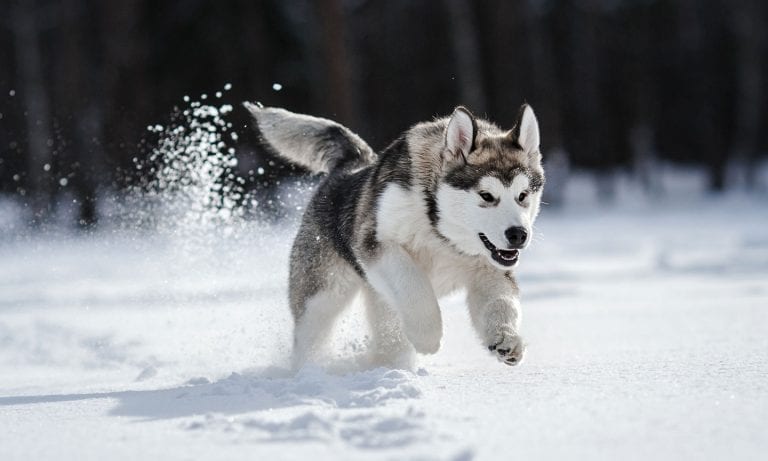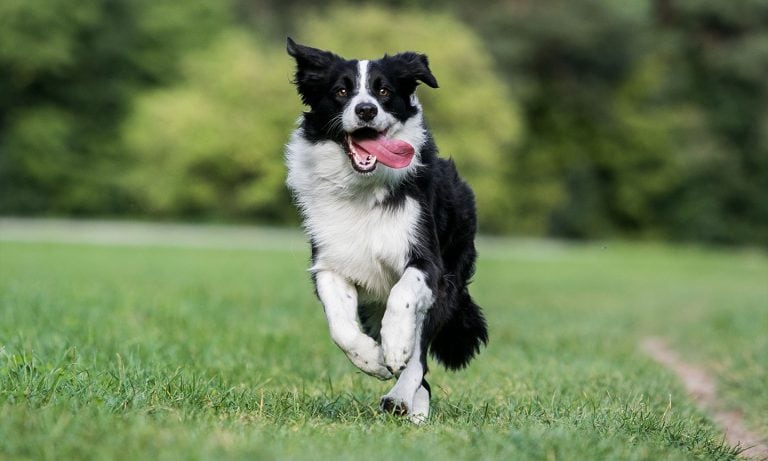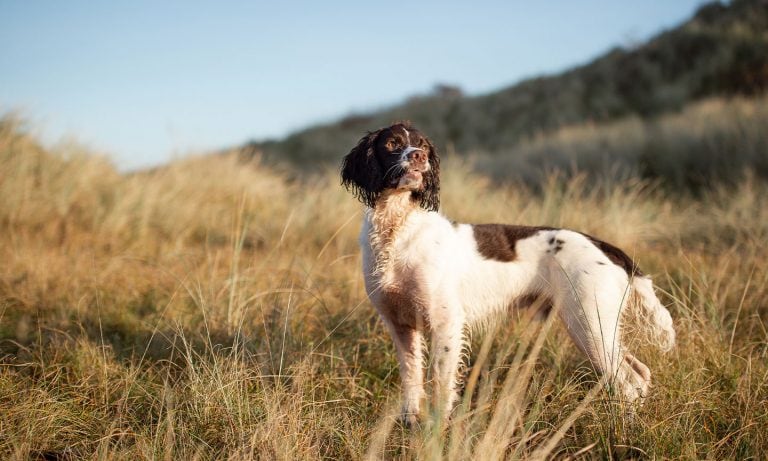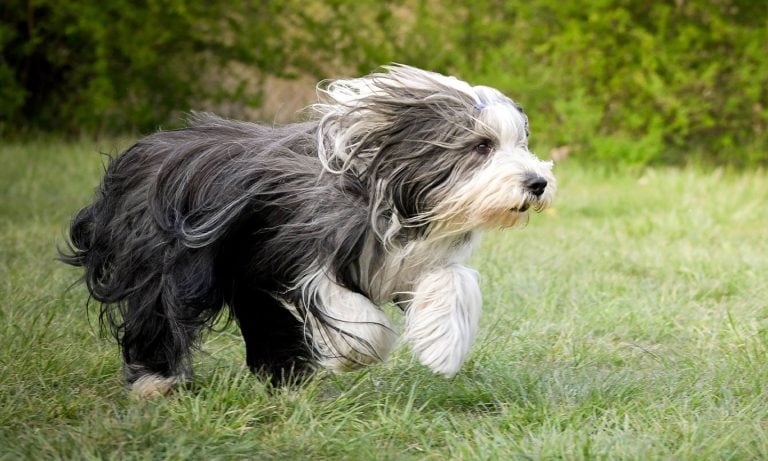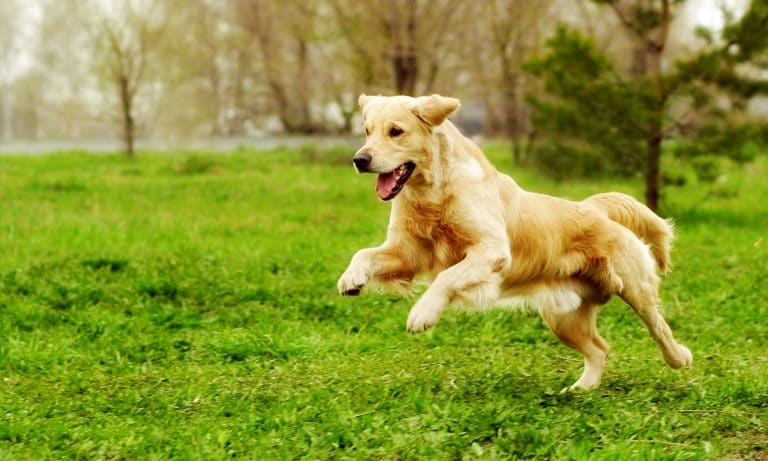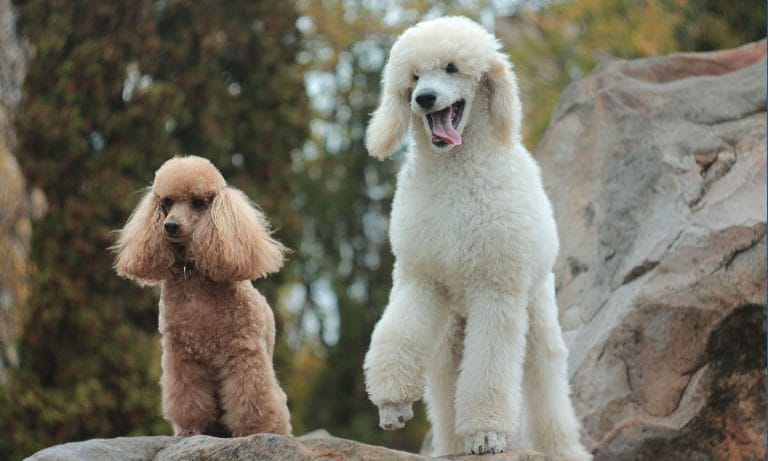If you lead an active lifestyle, the energetic Australian Shepherd breed might just be your ideal canine companion. As the jock of the dog park, an Aussie dog is always up for hiking, Frisbee and fetch. They’re competitive; excelling at tricks and stunts and in agility trials. Together, you two could take on the world… or at least conquer your next workout, yoga or SUP session.
Breed Snapshot
Temperament:
All-day EnergyUp-for-anything SidekickIntelligentCoat Color:
Blue MerleBlackRedRed Merle
Best For
Intelligent and energetic dogs, Australian Shepherds excel with active pet parents who can dedicate time to train them and teach them a few tricks. And they thrive in environments with plenty of room to run, exercise and engage in mental and physical activities, such as obedience training or agility.
Australian Shepherd Temperament
Australian Shepherds embody what they were bred to do: herd. They are fast, smart and always on the move. As such, providing training and outlets for all their energy are a must.
Because they have a natural herding instinct, Aussies may try to round up unsuspecting children or neighbors on a bike ride. For this reason, it’s crucial to train your Aussie early so they understand how to behave and what’s expected of them. Be sure your pup is well-trained before they go off-leash, too, because Aussies are known for their speed.
Cultivate their natural curiosity by implementing daily training sessions that engage their mind and their bodies. They want to please you, and daily training sessions will deepen your bond.
Playtime is another way to engage Aussies—and blow off some of that energy! Just about any game you invent will be enthusiastically enjoyed by your pup. Most Aussies adore fetching and can have impressive skills; they have a well-deserved reputation as disc dog champions. Throw a Frisbee for your pet at the park and onlookers are sure to be amazed at what your Aussie can do.
While your Aussie’s exuberant personality might make you think they are incredibly social, they tend to be cautious around strangers. Proper socialization when your Australian Shepherd is a puppy will help them feel comfortable in new environments with unknown people.
Bottom line: Aussies dislike downtime (except when they’re sleeping!), so keep them engaged with lots of outside time and toys, such as interactive chew toys, flying discs and balls.
How to Care for a Australian Shepherd
Hearty dogs bred for life on the farm or ranch, Aussies are relatively rough-and-tumble dogs who need outlets for their high energy, sharp minds and desire to work. A healthy Aussie is an active Aussie, so make sure to keep them active no matter the weather or your schedule.
Australian Shepherd Health
The Australian Shepherd breed has a lifespan of about 12-15 years and is generally hearty. Presently, the breed has a long life expectancy—it’s not unusual for an Aussie to live to 16 years old. However, there are a few health issues to be aware of:
- Hip Dysplasia: Hip dysplasia is a painful genetic condition in which the ball of the femur doesn’t properly fit into the hip socket. Environmental factors, such as obesity, can exacerbate symptoms, which means a healthy diet and regular exercise routine are crucial for Aussies. Vets can manage hip dysplasia in Aussies with physical therapy and medication; in some cases, they may need to do surgery.
- Eye Problems: Cataracts are the most common eye disease in Aussies. Aussies are also at risk of other eye defects, including Collie Eye Anomaly (CEA), a hereditary disease of the nerve and eye tissue that ultimately leads to blindness. Although surgery can treat cataracts, it won’t help with CEA. Aussies are also susceptible to distichiasis, a condition in which an eyelash grows abnormally, potentially scratching the eye. Depending on the severity, treatments range from an eye lubricant to surgery. Finally, iris coloboma is a condition seen in Aussies where the iris (colored part of the eye) does not develop properly and can lead to light sensitivity and discomfort. If you notice anything unusual about your Aussie’s eyes, bring it to your vet’s attention.
- Cancerous Tumors: Aussies have an increased risk of some cancers, particularly lymphoma and hemangiosarcoma (cancer from the cells that line blood vessels). Let your vet know if you notice any unusual growths, but remember some growths can be internal. Some growths are noncancerous (benign), but others are cancerous. Treatment options can include surgery, chemotherapy or radiation. Usually, the quicker the diagnosis, the more treatment options.
- Epilepsy: Epilepsy or seizures can be an inherited condition in Aussies. There are no genetic screening tests for epilepsy, but often the condition can be well controlled with daily, lifelong medication. If you have any concerns that your pet may be having a seizures, please see your vet immediately.
- Multidrug Resistance Mutation (MDR1): MDR1 is a genetic mutation commonly found in herding breeds including Aussies. This mutation makes dogs more sensitive to some medications, particularly Ivermectin, which is found in many heartworm prevention medications. There is genetic testing, which can detect if your dog has this mutation. While most commercially available heartworm prevention medications are still safe for dogs with MDR1 mutation when used as prescribed, it is always important to consult your veterinarian on the right medication for your pet.
Like with any pet, take your dog in for regular check-ups so you and your vet understand your Aussie’s healthy “normal.” This can help you better identify when your Aussie behaves atypically. Small changes, such as lethargy, lack of interest in food or water or urinating or pooping more or less frequently, may be a sign of a larger issue, so get changes checked right away.
Australian Shepherd History
A misconception about the Australian Shepherd’s origin is that they hail from Australia. Believe it or not, the Aussie’s story begins not in Australia but in the Basque region of Spain, near the Pyrenees mountains that border Spain and France. Here, herdsmen selectively bred the ancestors of the beloved Aussie for their herding abilities.
As people from the Basque region settled in Australia during the 19th century, they brought these working dogs with them. Over time, these dogs were bred with other herding dogs, like Border Collies, and found homes on Australian ranches.
As migration progressed from Australia to the American West, Australian Shepherds found footing in California, where the locals mistakenly assumed Australia was the dogs’ place of origin. California ranchers admired these dogs for their work ethic and exceptional herding abilities. As a result, they became valued for their abilities in the rodeo adding “rodeo performer” to their resumé.
The AKC added Australian Shepherds to the Herding group in 1993. Today, they are still regularly found on ranches and farms worldwide. Not only are they great additions to high-energy families, but Aussies can also be found working as service or therapy dogs and in jobs like search and rescue.
It’s commonly thought there are two types of Aussies: the Australian Shepherd and the Miniature Australian Shepherd. During the 1960s in California, breeders developed the Miniature Australian Shepherd by breeding to create a smaller body size while retaining the intelligence and activity level of the Aussie. But the dogs they used were unregistered, so their exact lineage isn’t clear. Today these diminutive dogs are known as the Miniature American Shepherd and entered the AKC Stud Book in 2015.
Are you looking to add an Australian Shepherd to your family? An Australian Shepherd can cost anywhere from $600-$2,000-plus for a purebred puppy. Be sure to do your homework on how to acquire a healthy puppy: Ask to see the parents and be sure that a breeders’ stock has health clearances for hips, elbows and eyes.
If you’d like to adopt, reach out to Australian Shepherd organizations, such as Aussie Rescue and Placement Helpline (ARPH), a nationwide network of Australian Shepherd rescues, keep an eye out for the breed at your local animal shelter, or search Chewy’s database of adoptable dogs in your area. With any rescue, you want to know what you are adopting: Look for a health status and temperament evaluation. As with all dogs, it’s essential to factor in veterinarian care, training, food and pet sitting into your budget, as well as the initial cost.
FAQs
Are Australian Shepherds hypoallergenic?
No, Australian Shepherds are not hypoallergenic. Australian Shepherds are heavy shedders, so with all that fur and dander, people with allergies may need to love this breed from a distance.
Are Australian Shepherds smart?
Yes, Australian Shepherds are incredibly smart. One of the primary Australian Shepherd traits is their intelligence. Australian Shepherds are naturally smart and curious, and they love a challenge. Training, fulfilling their exercise needs and giving them plenty of attention will help keep their smarts channeled in positive directions.
Are Australian Shepherds good with kids?
Australian Shepherds are good with kids, especially older ones. Aussies look for things to herd and will lean into their herding instincts when small kids and babies are around. In an active family with older kids who have time and energy to play, Aussies can thrive, but training and patience are required to help an Aussie accept that kids and babies don’t need corralling.
Do Australian Shepherds have tails?
Australian Shepherds have tails, and there’s a one-in-five chance that an Aussie will have a naturally bobbed tail since they were bred that way for effective herding. If an Aussie is born with a long tail, the breeder will often dock it to protect it from injury and maintain the look of the breed.
The AKC breed standard allows for their tail to be docked straight, docked or naturally bobbed. Docking involves cutting a portion of the dog’s tail off when they are puppies. Many countries and states have banned it for medical and behavioral reasons, and some veterinary groups oppose it.
What colors are Australian Shepherds?
Four colors are recognized by the American Kennel Club (AKC): black, blue merle (a bluish-gray coat with irregular markings and splotches of black), red or red merle (a buff or silver coat with irregular markings and splotches of red). They often have a shaggy white mane.
How big do Australian Shepherds get?
Australian Shepherds come in various sizes. Females can range from 18-21 inches tall from the top of the withers (the area just above the shoulder), weighing between 40-55 pounds. Males can range from 20-23 inches tall, typically weigh 50-65 pounds and are considered medium in size.
Australian Shepherds vs. Border Collies: What’s the difference?
While both breeds have herding instincts, their styles differ. Border Collies are intense, work-focused herders, while Australian Shepherds are more adaptable and family-oriented. Border Collies are highly driven and obedient, excelling in tasks like agility. Aussies also excel in competitive dog sports, but their silliness tends to make them better family pets.
What are the most popular Australian Shepherd names?
Top names for an Australian Shepherd include Luna, Cooper, Bella, Charlie, Koda, Bear, Sadie, Bailey, Milo, Stella, Lucy, Blue, Max, Finn, Tucker, Daisy, Jax, Lola, Oliver and Penny. For more name inspiration, check out our dog name guide.
What are the most common Australian Shepherd mixes?
The most common Australian Shepherd mixes are:
- Australian Shepherd-Golden Retriever mix (Golden Aussie or Australian Retriever)
- Australian Shepherd-Border Collie mix (Border Aussies or Aussie Collies)
- Australian Shepherd-Husky mix (Aussie Husky or Aussie Siberian)
- Australian Shepherd-Labrador (Aussiedor)
- Australian Shepherd-Corgi (Auggie or the Corgherd)
- Australian Shepherd-German Shepherd (German Australian Shepherd)
Note: These are not purebred dogs but mixed breeds.
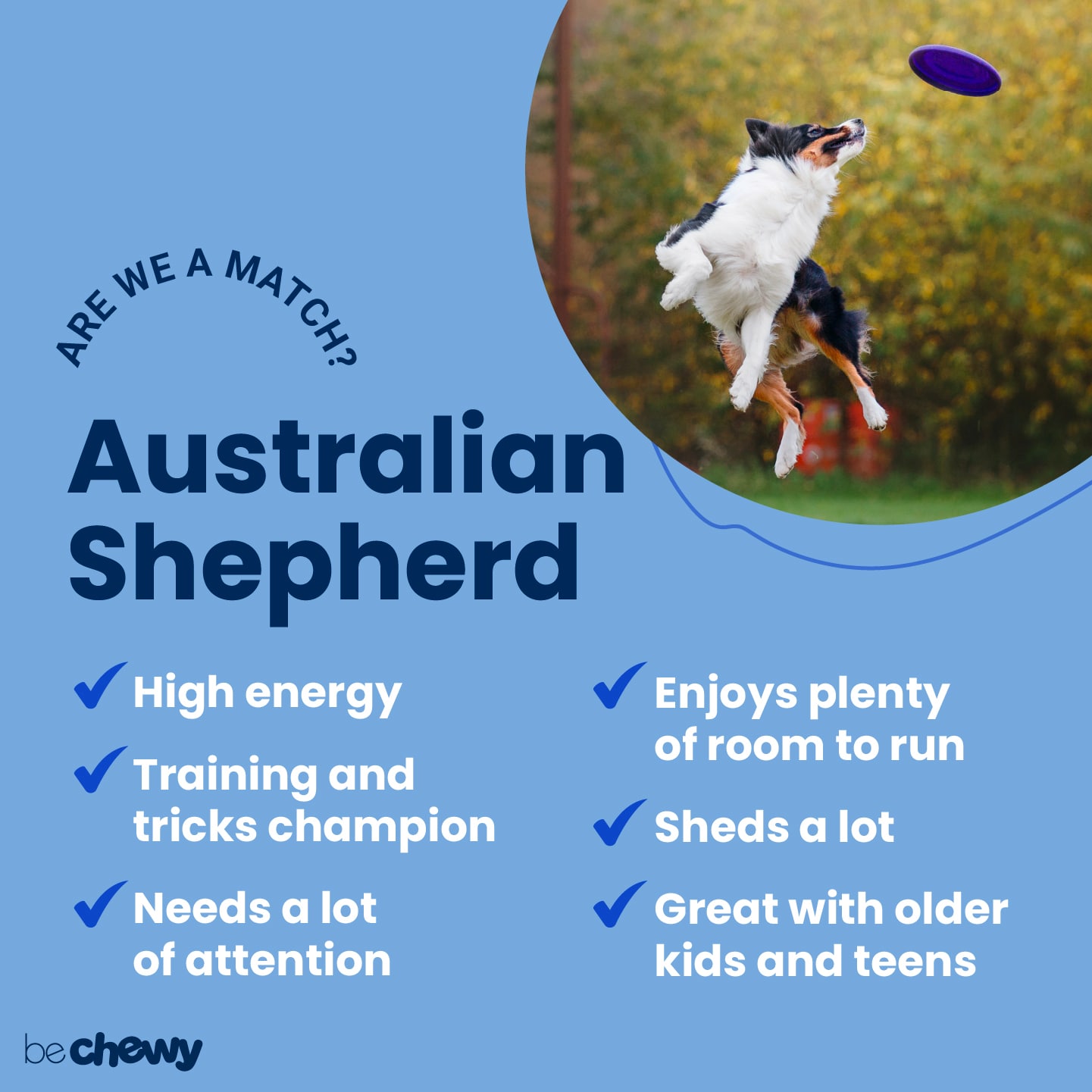
Top Takeaways
With a lot of energy, loyalty and love to give, life with an Australian Shepherd will never be boring. They are ready for any challenge you give them and love competition. If you’re ready to hike, bike, explore the outdoors and form an unforgettable bond with a canine companion, you can’t beat an Australian Shepherd.
Expert input provided by Dr. Deb Breitstein, DVM, a New Jersey based veterinarian with IndeVets; Merissa Kriedler, CPDT-KA, KPA CTP, a trainer at Fuzzy Logic Dog Training in Louisa, VA; and Robin Prouty, Vice President of the United States Australian Shepherd Association.
Breed characteristic ratings provided by veterinarian Dr. Sarah J. Wooten, DVM, CVJ, a veterinarian at Sheep Draw Veterinary Hospital in Greeley, Colorado; dog trainer and behavior consultant Irith Bloom, CPDT-KSA, CBCC-KA, CDBC, owner of The Sophisticated Dog, LLC, in Los Angeles; and certified animal behavior consultant Amy Shojai, CABC, in Sherman, Texas.
The health content was medically reviewed by Chewy vets.

Search for Adoptable Australian Shepherds Near You
Top Australian Shepherd Names
These are the top Australian Shepherd names as chosen by Chewy's pet parents!
Female Names
- Luna
- Bella
- Willow
- Sadie
- Daisy
- Piper
- Lucy
- Ruby
- Stella
- Bailey
Male Names
- Cooper
- Milo
- Koda
- Bear
- Loki
- Finn
- Ollie
- Tucker
- Charlie
- Oakley
Share:
